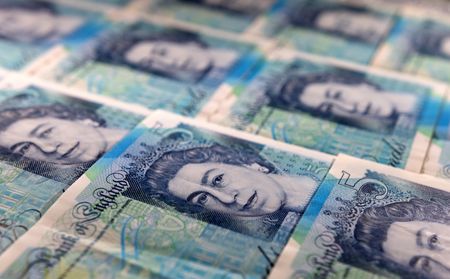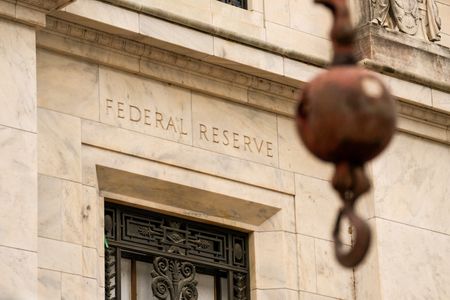By Greta Rosen Fondahn
(Reuters) – The pound dropped against the dollar and euro on Friday, after data showed that British retail sales fell unexpectedly in December, adding to an already-gloomy economic outlook.
Retail sales, adjusted for the inclusion of the Black Friday sales at the start of the month, fell by 0.3% month-on-month in December after a downwardly revised 0.1% expansion in November, the Office for National Statistics said.
Economists polled by Reuters had forecast a monthly increase in retail sales of 0.4%.
The pound fell 0.3% against the dollar to $1.2197, not far from the 14-month low it touched on Monday.
Traders added to their bets on Bank of England rate cuts after the figures, and now price in 66 basis points in cuts during 2025.
This compares to the 42 bps of rate cuts investors expect from the U.S. Federal Reserve this year.
A strong U.S. economic outlook, along with investor views that policies expected of President-elect Donald Trump could increase price pressures, has boosted the greenback against other major currencies.
Concerns about the UK’s fiscal outlook put additional pressure on the British pound and bond prices last week.
The pound, last year’s best performing G10 currency against the dollar, has lost 2.4% so far this year.
The euro, on the other hand, has only fallen 0.5% against the dollar, and gained 2% over the pound, even as investors price in over 95 bps in rate cuts from the European Central Bank in 2025.
While yields on UK government bonds, so-called gilts, have since fallen back from their recent highs, the challenges facing British finance minister Rachel Reeves linger.
“Fundamentally, the UK continues to grapple with a stagnating economy, along with sticky price pressures – a grim combination…,” said Michael Brown, strategist at Pepperstone.
The British economy grew more slowly than expected in November, data showed on Thursday.
Investors are hunkering down for a stretch of losses as ructions in the pound, government bonds and stocks feed on each other and put Britain at risk of a wave of hedge fund attacks.
“It’s difficult to see really how things are going to turn around from here,” said Fiona Cincotta, senior market analyst at City Index, highlighting that a large proportion of retailers were looking to pass on costs from a higher tax burden.
Two-thirds of British retailers will raise prices this year in response to higher employer social security costs introduced in the new Labour government’s first budget, a survey of finance chiefs showed on Wednesday.
“We’re looking really at this stagflationary outlook… And we’re seeing that reflected in the weak pound,” Cincotta said.
The euro rose 0.3% against the pound on Friday to 84.42 pence.
(Reporting by Greta Rosen Fondahn, editing by Philippa Fletcher)











